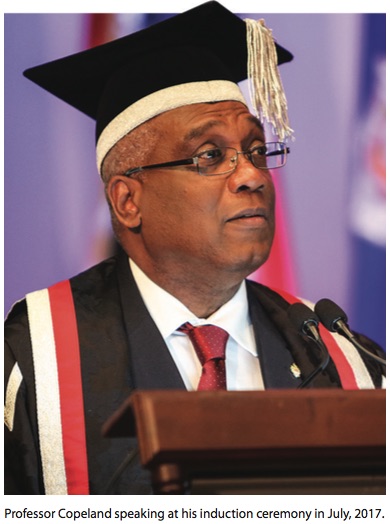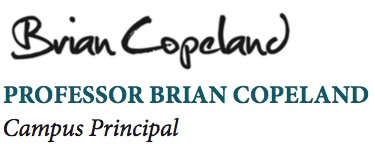
Academic year 2021/2022 has come to a close, and with it my tenure as Campus Principal at this magnificent institution. These six years as leader of the St Augustine Campus have been rewarding, enlightening, but challenging. I expected no less. I am truly grateful for the opportunity to contribute to the well-being and growth of the society and the university.
The UWI is inextricably of, for and by Caribbean society. It is one of our best and most dependable assets in the quest for regional development and prosperity. Its role, enshrined in the letters of the institution’s birth nearly 75 years ago, is our great purpose and responsibility. We must never lose sight of it, strive to maintain it, and rely on our creativity, knowledge and capacity for persistent effort to advance it.
My tenure as Principal has been guided by the following principles that were fine-tuned over the past six years:
I must make mention of my view that a necessary condition for educational success at the national level, is the need to ensure that citizens are guided and educated to optimally develop their primary assets – their mental and physical abilities.
The NES that I speak of comprises all institutions of formal education from ECCE, primary, secondary, and tertiary – community colleges, vocational institutions and universities. The role of universities spans, in part, the teaching and learning activities required to sustain society as described in Principle 1, a responsibility that is shared by the other NES players, albeit generally at a lower level. However, universities are at the forefront in the research, development and innovation activities required to grow society as elucidated in Principle 3. No institution can be called a university unless it has the capacity to seriously address Principle 3. Of significance is the fact that its staff must include those who have mastered the requisite research abilities and who are expected to nurture and influence the growth of new talent in the student population.
It has been a difficult journey at times, more so as, given the momentum consequent to our colonial past, these guiding principles have been tough to communicate. Still, I have confidence that we can get to the point where we have a Caribbean NES that is specifically tuned to our real needs.
In messages such as this, and frankly at a time when a certain measure of cynicism is a rational and justified response, I am always concerned that these statements will be seen as platitudes. However, the difference between platitudes and the achievement of success is what comes after the words have been written. In this regard, I am proud to say that UWI St Augustine has embarked on a journey that will see it becoming the university of the future that more fully embraces its societal leadership role. Although I will no longer be directing that path, I am completely invested in its continuation and dedicated to its success.
There are some reasons to be optimistic. The region has made it through the worst of the pandemic; and while it is still with us, we are now able to recover some of our lost productivity and social engagement. Last month, we reopened the campus to staff. This coming September, we will welcome our new and returning students to UWI St Augustine for in-person classes.
I am extremely satisfied as well with how the campus community dealt with the pandemic. We saw a remarkable burst of activity to transition to virtual learning. There was enormous outreach from our student services to support students in need, whether those needs were material (such as devices for online learning) or health-related (such as vaccinations and counselling).Our UWI experts provided their knowledge to the nation that helped T&T understand the crisis and take precautions to protect themselves. We supported the government's national response. We even branched out with home-grown initiatives that engaged governmental organisations and the private sector to help our country through this perilous moment.
However, I feel it is vital that we recognise the many very serious challenges we face, as a university and a society. The world is still dealing with the economic and political fallout of the pandemic. Several geopolitical crises are in full effect, most notably the Russia/Ukraine conflict, which is already having a detrimental effect on the global food supply.
Many countries are dealing with serious economic threats due to inflation. The climate-related risks that scientists have predicted for years are now every-day reality. I dare say that the convulsion we are experiencing may be evidence of the world reshaping itself. Trinidad and Tobago also has its own chronic challenges that have been with us even before the pandemic.
We are in difficult times. That is not an inherently optimistic message, but it is far from a pessimistic one. Some of the greatest human achievements were the result of people solving problems, under dire circumstances. As I have often repeated, it takes a lot of pressure and heat to form a diamond. Also, a reminder to the scientists among us that Newton’s law applies in all aspects of life – force is required to effect a change in motion.
I have been a part of this institution for most of my life as a student, lecturer, administrator, researcher, and inventor. This campus is my home. I have seen it expand over many decades to the powerhouse it has become, the heart of intellectualism, the arts, the sciences, professional training at the highest level, and scholarship. I’ve seen many of its graduates go forth and become the leaders of society.
Now, I look forward to witnessing what happens next. I wish greatest success to Campus Principal Designate Professor Rose-Marie Belle Antoine. I have every confidence in her leadership skills and her vision for the campus. She is a proven leader with a strong will and an outspoken voice on many of the most important topics of our time.
To the entire campus community, I know you have what it takes for this campus to thrive, even in tough circumstances. Give your best. Demand the best from your colleagues and peers to work for continued success of the institution. Remember, that beneath all the pomp and ceremony, we are here to serve, our students and a society that will fully understand over the course of time that “the efficient growth of this university is almost their only path to prosperity” (Prime Minister Errol Barrow 1968).
